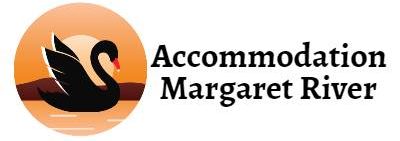Disclosure: This article may contain some affiliate links which means that I may earn a small commission when you click on them, at no additional cost to you. See my Disclosure Policy for more information.
Best Cape To Cape Walk Accommodation: Locals Guide
Are you looking for some Cape to Cape Walk Accommodation for when you’re walking the Cape to Cape Track?
The Cape to Cape Track is a world-renowned walking track in the Margaret River Region of Western Australia, that runs from Cape Naturaliste in the north and down to Cape Leeuwin in the south. The track takes in some of the most beautiful and rugged coastlines in Western Australia and offers walkers the opportunity to experience it first-hand.
There are a number of accommodation options available for those walking the Cape to Cape Track. Campsites are dotted along the track, providing basic facilities for walkers. There are also a number of caravan parks, as well traditional accommodations from the budget to the luxury and everything in between. Whatever your budget or preferences, there is almost definitely an accommodation option to suit you.
I’m a tourism and accommodation expert, as well as a local to Margaret River, and in the 6 years I have lived in Margaret River I’ve helped literally thousands of people plan and enjoy their Cape to Cape experiences!
Ready to discover the best Cape to Cape Walk Accommodation? Let’s get to it!
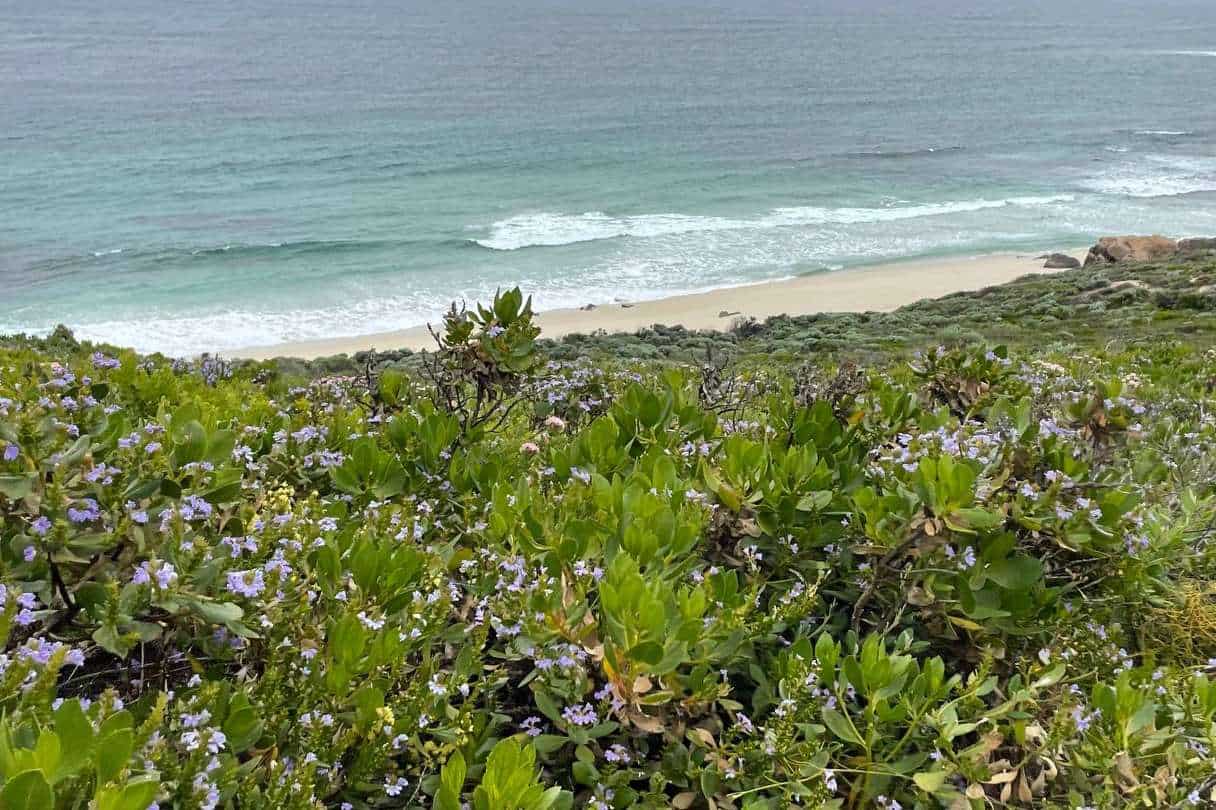
Where Should I Stay On The Cape To Cape Walk Accommodation?
Where you should stay when walking the Cape to Cape Track depends on a few things, and it will be unique for each person. In no particular order, here are my thoughts about the Cape to Cape Track accommodation:
Option 1: My Recommendation – Stay In Margaret River The Entire Trip
If you’re looking for the most comfortable (ie. not camping!) and hassle-free experience possible, I recommend that you stay in Margaret River for the duration of your trip.
If you have bought your own vehicle and are also organizing transfers along the track, you can start each day of your walk from your accommodation and you won’t have to worry about lugging all your gear with you. Staying in one place also means that you can settle in, make yourself at home, and not have to pack up every couple of days and move all of your gear (with the added bonus of hot showers and a proper bed every night!)
Staying in Margaret River is an excellent choice because not only is it a central point of the track, but if you stay in town, you are within walking distance to a whole heap of great restaurants for dinner, and supermarkets which are open 8 am – 8 pm daily, as well as the local chemists which have similar opening hours (blister pads, anyone?)
I would also recommend that if you are doing the standard 7-day itinerary, that you book an extra night in the beginning. This is so on your first day, you are driving to Margaret River and settling into your accommodation, and ready to start walking after a good night’s sleep.
The alternative that I see a lot of people recommend, is to drive straight from Perth to Cape Naturaliste, have lunch, and then start the walk to Yallingup. The problem with this is that if you’re running late, it means you could be walking into darkness, which you definitely don’t want.
It can also be challenging to find someone to transfer you in the afternoon, as they mostly do them in the morning (not saying you can’t it could just be more difficult if you want to start on a Saturday for instance, as all the transfer companies will be tied up doing weddings and wine tours), not to mention you will definitely arrive late to your accommodation and then that could cause other issues, like if you need to get anything from the supermarket, etc. before they close.
Anyway, my point is that there are plenty of comfortable places to stay in Margaret River, from camping and caravan parks to luxury hotels and everything in between, so why not stay at one an extra night?
Where Should I Stay In Margaret River?
I have a list of 15 Best Accommodation In Margaret River, which is pretty comprehensive, but if you don’t have time to read through all of this, here are my top picks based on different categories:
- Best Budget/In-Town/Motel: Margaret River Motel, Stay Margaret River, Edge Of The Forest Motel
- Best B&B/Guesthouse: Rosewood Guesthouse
- Best Chalet/Cottages: Bushy Lake Chalets
- Best Glamping: Margaret River Retreat
- Best Holiday House: The Roozen Residence
- Best Luxury: Losari Retreat
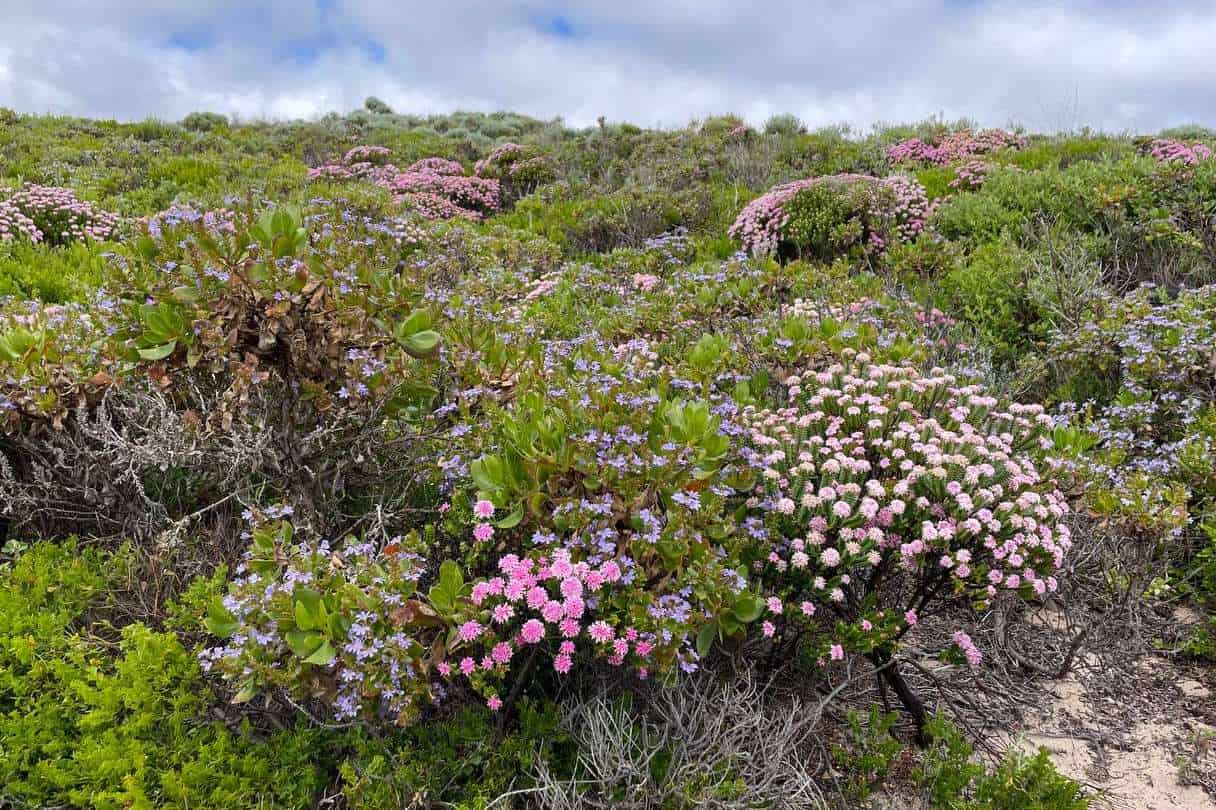
Option 2: Stay 2-4 Nights At Several Different Locations Along The Track
There are a lot of options with this one. For instance, you could have a pre-night in Busselton, two nights in Dunsborough or Yallingup, then move to Gracetown for a couple of nights, Gnarabup/Prevelly for a couple of nights, then finish by staying in Augusta at the end, or any number of variations of this.
I do not recommend this. People will tell you that you save time because you’ll spend less time in the car, but this is my opinion: I have moved people’s cars loads of times up and down the track as they walk, and the total distance you would drive to do the Cape to Cape if you were staying in Margaret River the entire time, is somewhere around 450km – 500km for the whole week, spread over 7 days. I don’t think that’s THAT much time in your car.
Weigh this up against the time you would spend finding someone who will move your stuff (especially if you’re self-catering, how would you keep your food cold?), unpacking your stuff, packing your stuff, getting your bearings at a new location, having to drive into Margaret River anyway to pick up supplies… I don’t think you achieve anything by staying at different locations along the track.
That being said, if this is something you really want to do, here are my recommendations on where to stay along the track:
- Best In Dunsborough: Whalers Cove Villas
- Best In Yallingup: Seashells Yallingup
- Best In Gracetown: Gracetown Caravan Park
- Best In Prevelly: Beachside Prevelly Villas
- Best In Augusta: Turner Holiday Park
Option 3: Stay In One Town (Not Margaret River) The Entire Time
If you are looking for Cape to Cape Track accommodation where you don’t have to move mid-stay, this is also a fairly good option I think.
Say, if you have a holiday home in Dunsborough or Augusta that you like, you could quite easily stay there for the whole week, as it doesn’t really change anything.
Some of the days will just be shorter if they are closer to you, and the further away days are going to be longer. Same same as staying in Margaret River the whole week.
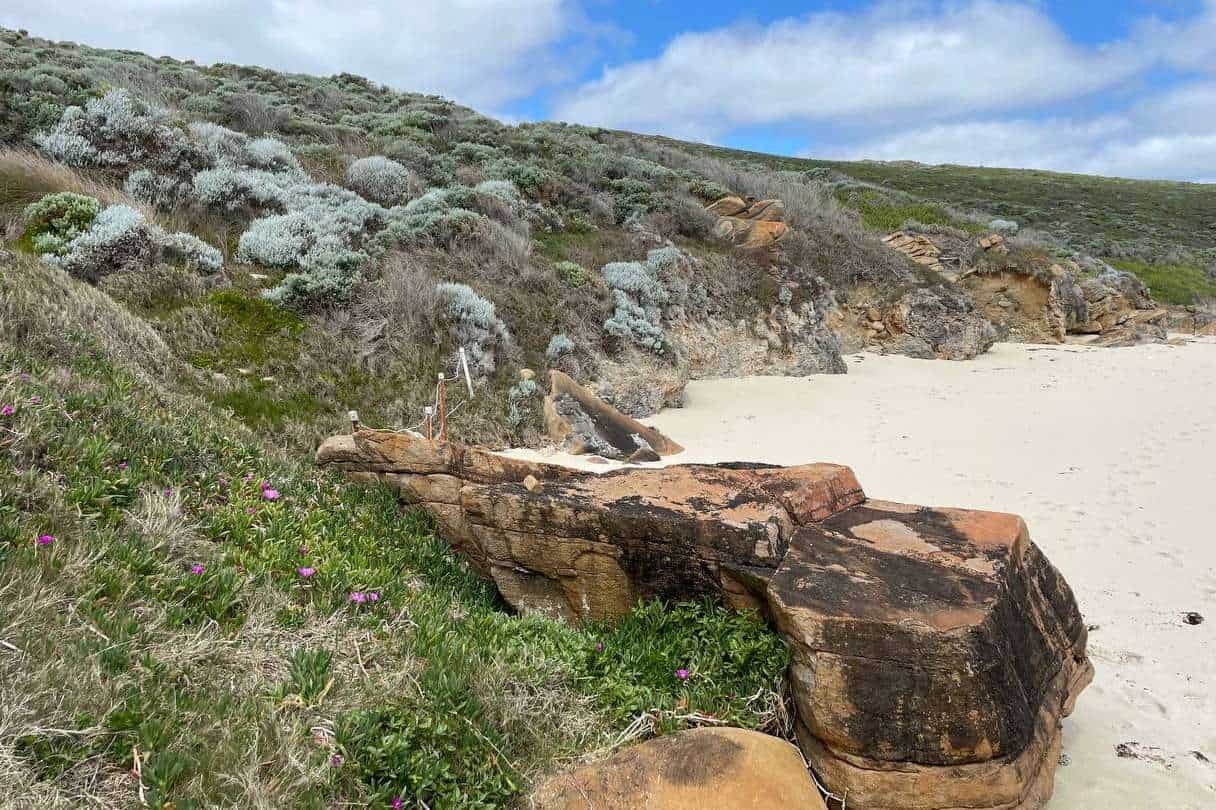
Option 4: Stay Along The Track At The Campsites/Caravan Parks
This is not an option I would pick, as I am not the sort of person who likes to a. sleep in tents, b. sleep in a tent on the ground, or c. carry my tent and bed anywhere basically.
But don’t let me stop you if this is something that you like doing!
There are four low-key free campsites along the track in the National Park, as well as park and commercial campgrounds and caravan parks. Combine these together and you have places to camp roughly a days walk apart along the length of the track.
Each of the Track campsites have a bush toilet, a rainwater tank and picnic tables.
Following the ‘normal’ Cape to Cape Track itinerary, this is what your week would look like, if you were to camp the whole way:
- Day 1: Cape Naturaliste to Mount Duckworth Campsite (free, no booking)
- Day 2: Mouth Duckworth Campsite to Moses Rock Campsite (free, no booking)
- Day 3: Moses Rock Campsite to Ellensbrook Campsite (free, no booking)
- Day 4: Ellensbrook Campsite to Prevelly Caravan Park (accommodation, book here)
- Day 5: Prevelly Caravan Park to Contos Campground (paid camping, book here)
- Day 6: Contos Campground to Deepdene Campsite (free, no booking)
- Day 7: Deepdene Campsite to Cape Leeuwin (drive back or stay in the region)
Option 5: Stay Along The Track At A Mix Of Accommodation And Camping
This is what I would do if I wanted to carry my own pack along the way, but still, be able to stay at Cape to Cape accommodation and have a hot shower and a place to charge my phone (as much as possible anyway). The only issue I can see with this is some places may have 2-night minimums, so bear this in mind when planning.
Following the ‘normalish’ Cape to Cape Track itinerary, this is what your week would look like, if you were to stay at accommodation where you can the whole way, with two nights in campsites thrown in for good measure (also, because there’s no real way around it!):
- Day 1: Cape Naturaliste to Yallingup or Smiths Beach
- Day 2: Yallingup or Smiths Beach to Moses Rock Campsite (free, no booking)
- Day 3: Moses Rock Campsite to Gracetown
- Day 4: Gracetown to Prevelly/Gnarabup
- Day 5: Prevelly/Gnarabup to Contos Campground (paid camping, book here)
- Day 6: Contos Campground to Hamelin Bay
- Day 7: Hamelin Bay to Cape Leeuwin (drive back or stay in the region)
At the end of the day, it is your holiday and your adventure, so feel free to mix and match any of the above suggestions to create your perfect Cape to Cape Track itinerary! Just remember to factor in rest days, if you think you will need them (Locals tip: lots of people do, no shame in that!)
I hope this has given you some ideas on where to stay along the Cape to Cape Track.
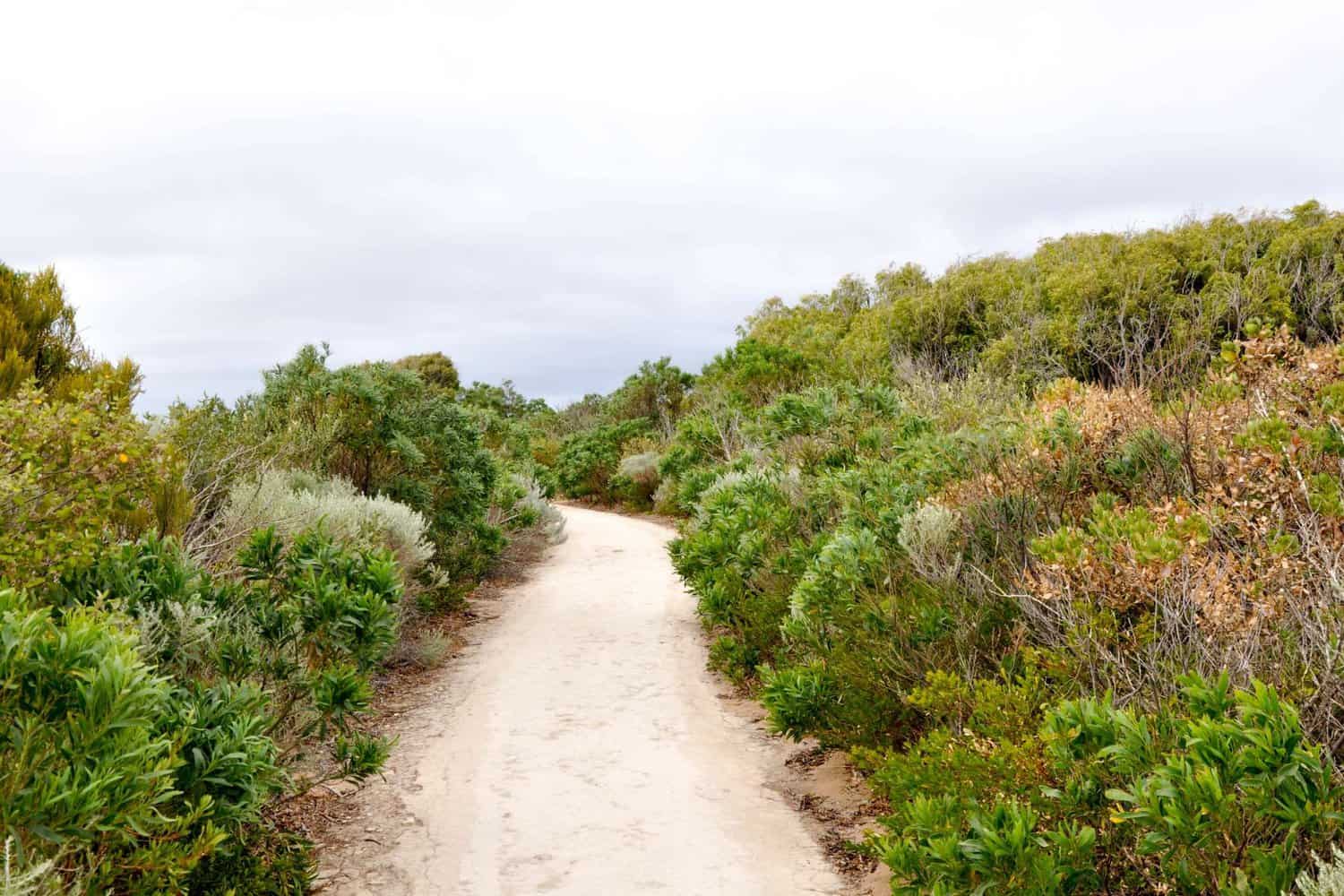
FAQs About The Cape To Cape Track
Where Is The Cape To Cape Walk?
The Cape to Cape Walk Track is located in the southwest of Western Australia, between Cape Naturaliste and Cape Leeuwin. Spanning the length of 123km along the Leeuwin-Naturaliste Ridge, you will be rewarded with views of both the Indian and Southern Oceans, as well as some of the most beautiful coastlines in the world.
Where Does The Cape To Cape Start And Finish?
The Cape to Cape Track starts at the Cape Naturaliste Lighthouse, near Dunsborough, and finishes at the Cape Leeuwin Lighthouse, near Augusta.
Are Dogs Allowed On The Cape To Cape?
Dogs are not allowed on the Cape to Cape Track as it traverses through National Park. For this track, leave the dogs at home! Check out my list of Dog-Friendly Beaches In Margaret River if you’d like some suggestions on where you can walk your dog on the coast.
What’s The Best Time To Do The Cape To Cape Walk?
The Cape to Cape Track can be completed all year round, although the best time to walk it is during the shoulder seasons of spring (September-November) and autumn (March-May). These months offer the best weather conditions, with moderate temperatures and low rainfall.
Spring is a great time to walk it because all the wildflowers are out. Because of this, spring is also the busiest season on the track as well.
If you walk it during winter, be prepared to get wet, and if you walk it during summer, be prepared to leave early in the morning because it will be hot!
How Long Does It Take To Walk The Cape To Cape?
The average person takes around 7-9 days to complete the track, although it can be done in shorter or longer timeframes depending on your fitness level and how many kilometers you walk per day. I have seen people complete the walk in 4-5 days and walk upwards of 40km per day, whereas others like to keep it to 10km – 15km a day and spread it out over 9-10 days.
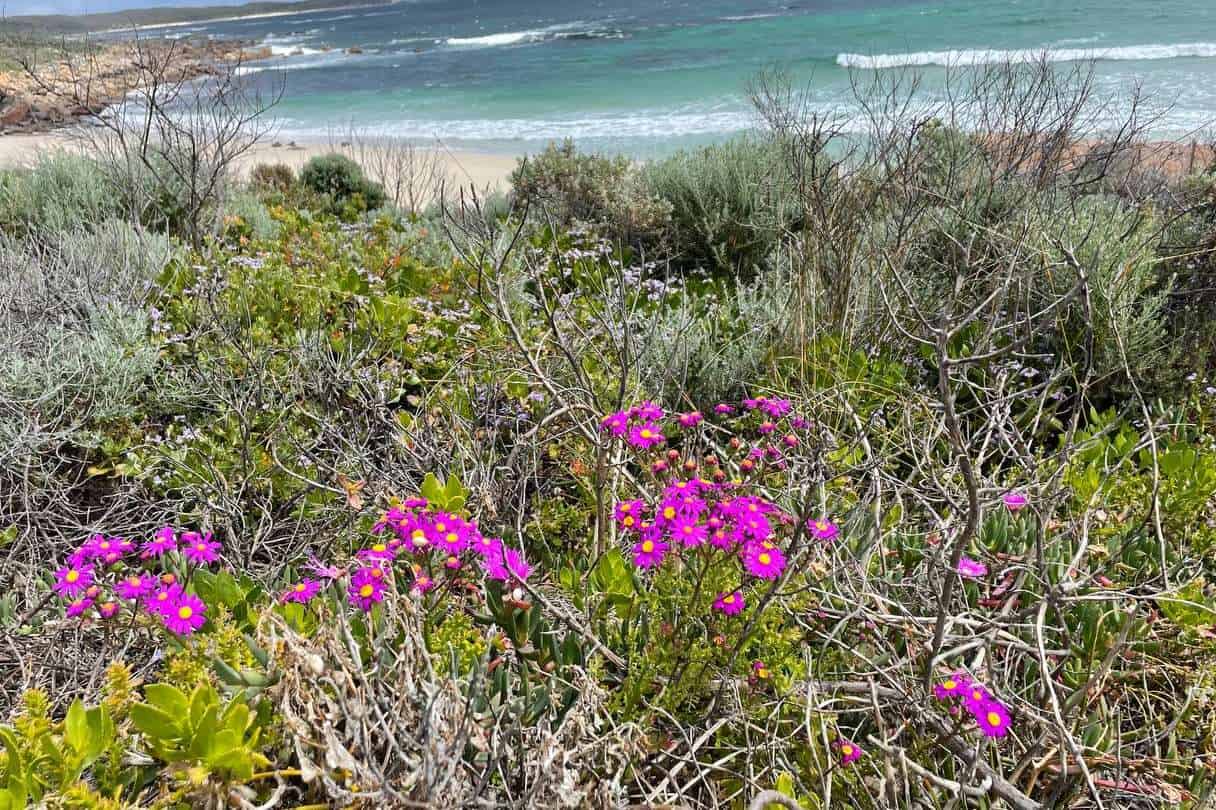
How Hard Is The Cape To Cape Walk?
The Cape to Cape Track is considered a moderate-grade walk, with some sections that are more challenging than others. It’s always best to be prepared before you go and make sure you have a good level of fitness before attempting the walk. That being said, I have seen people of all ages and abilities walking the track, so if you take precautions, and are sensible about your capabilities, you will be fine!
There are a few river crossings along the track, and some sections that are quite steep, but overall it is doable for most people. I would not recommend attempting it if you have any doubts about your fitness or ability to walk long distances.
Is Cape To Cape Part Of The Bibbulmun Track?
No, the Cape to Cape Track is not part of the Bibbulmun Track. The Bibbulmun Track is a long-distance walk that goes from Kalamunda in the Perth Hills all the way down to Albany on the south coast. It is 1,005km in total and takes most people around 2 months to complete.
The Cape to Cape Track is a much shorter walk, at only 123km, and can be completed in around 1 week.
When planning your trip, make sure you take into account the different fitness levels required for each walk. The Bibbulmun Track is definitely more challenging than the Cape to Cape!
Can You Ride The Cape To Cape?
The Cape to Cape Track is a walking track, and therefore you are not allowed to ride your bike on it. Mountain biking is only allowed on designated mountain bike trails in the area.
If you’re looking for a great place to go mountain biking, I would suggest reading Mountain Biking Margaret River: Your Complete Guide for some suggestions on where to go mountain biking.
Are There Toilets On The Cape To Cape?
There are toilets located at all the major campsites along the Cape to Cape Track. These are long-drop toilets (i.e. there is no flush) and they are usually located a short walk from the campsite itself.
Toilet paper is not provided, so make sure you bring your own! There are also no bins at the toilets, so everything you bring in with you must be taken out when you leave.
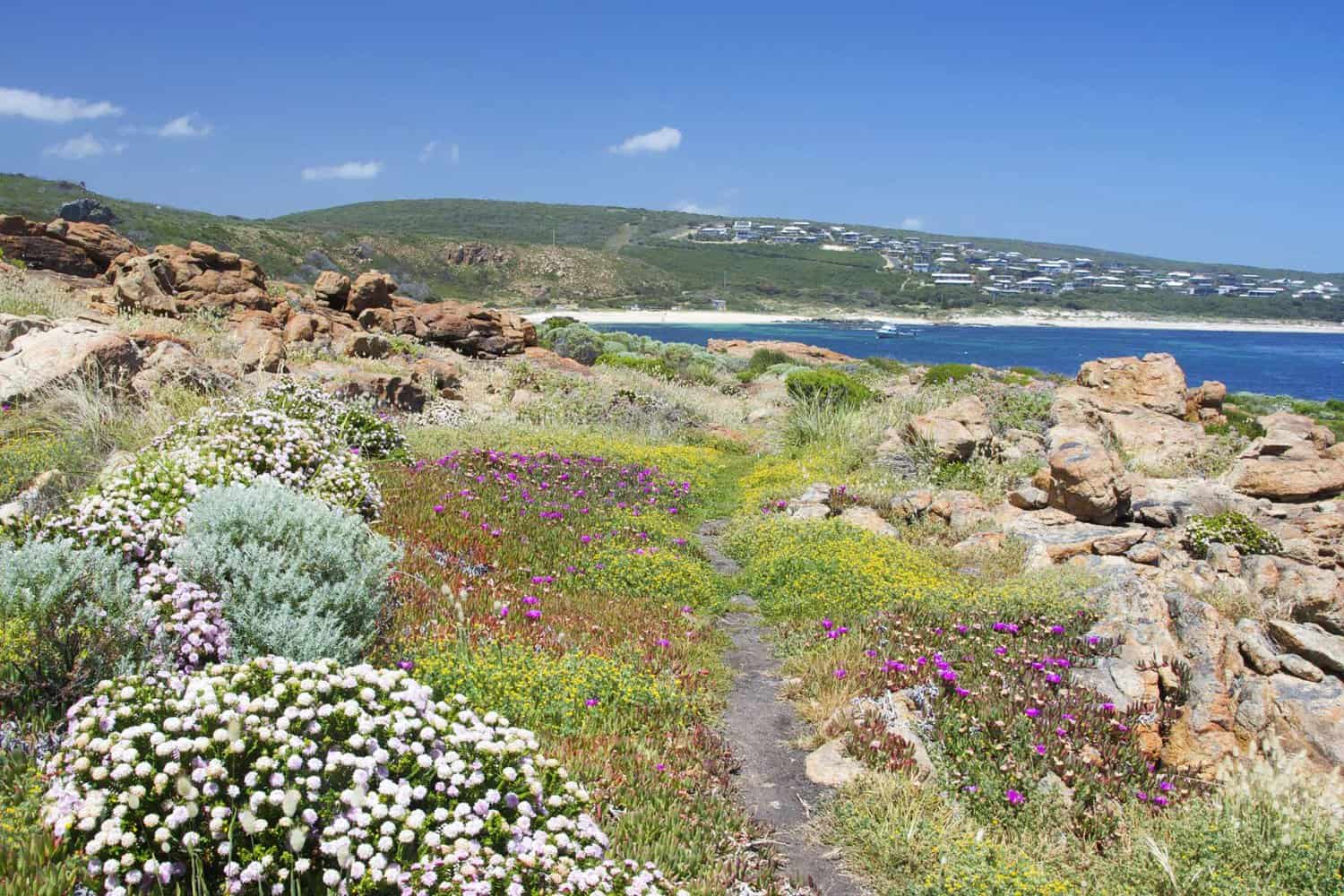
Wrapping Up: Cape To Cape Walk Accommodation
The Cape to Cape Track is a great walk with plenty of accommodation options to suit all budgets and needs. Hopefully, I’ve given you some suggestions for some good Cape to Cape Walk accommodation. There are campsites located along the track, as well as a range of hotels, hostels and holiday houses in the towns nearby.
Whether you want to rough it in a tent or enjoy some luxury after a long day of walking, you’ll be able to find something to suit your needs.
Just make sure you book in advance during the busy season!
Read More About Local Accommodation:
Australia Travel Planning Guide
🚑Should I buy Australian travel insurance?
100% YES! — Australia has “free” healthcare but it’s only for citizens and permanent residents. Foreigners visiting need travel insurance in case anything happens on their visit. I like SafetyWing – their Nomad Insurance starts at just $1.50 USD a day!
🚗Should I rent a car in Australia?
Yes — Renting a car is a necessity in most of Australia! If you want to go on road trips or adventures outside of the major cities, and even if you’re staying in a major city, you’ll want to rent a car. If you are visiting Margaret River, it will be even more important that you hire a car, you’ll need it to be able to get around and see all the great attractions and wineries!
🏨What’s the best way to book my Australian accommodation?
My go-to for Australian hotels is Booking.com. Pretty much all registered accommodation use Booking.com (but not necessarily any of the other major booking platforms), and even most of the holiday homes and caravan parks use Booking.com too!
If you’re planning a trip to Australia where you will stay at multiple locations, it’s super handy to have all your accommodation listed in one place, and accommodation owners like Booking.com because it’s easy to contact the guests using the messaging platform if the guest has an international phone number.
I sincerely hope you enjoy your visit to Margaret River!
